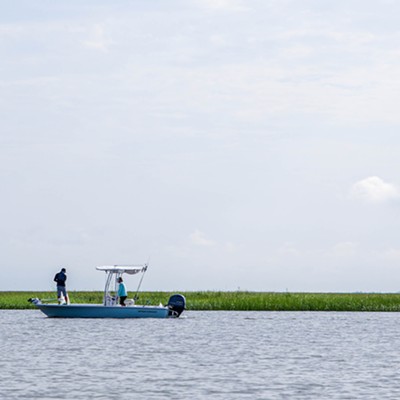The state's Environmental Protection Division (EPD) office in Savannah closed July 1, the most recent victim of the state's ongoing budget cuts. Shuttering the local office raises questions about whether regulatory oversight in the area is sufficient to monitor the range of industry and development here.
"We are running bare bones," says Darrell Crosby, the Coastal District Manager for the EPD.
Although most of the staff was retained, consolidated with the district headquarters in Brunswick, pushing staff further away from industry and the Savannah River could prove risky.
"They're still expected to put out the same number of permits. They're still expected to cover the same area of regulation, but now they're two hours away from the area they're supposed to be regulating," says Bonitatibus, Executive Director of the Savannah Riverkeeper, a non-profit dedicated to monitoring the river.
While there are still EPD staff living in the Savannah area and working remotely from headquarters, local staff has decreased to a total of eight, who are responsible for monitoring and inspecting underground storage tanks, solid waste, air quality, drinking water systems, waste water outflow and the environmental impacts of development.
Juggling so many responsibilities would seem to increase the chances of missing potential violations.
"So far, we've been able to maintain our frequency of inspection that meets what we've agreed to with the Environmental Protection Agency (EPA)," says Crosby. "But if we continue to lose staff and can't field positions, [the frequency of inspections] might be something we have to look at in the future."
Between fiscal years 2006 and 2008, the amount generated by natural resources revenue, including solid waste fees and fines to violators, had steadily increased nearly $5 million, from $46.9 million to $51.8 million. After budget cuts, including eliminating 22 positions through attrition, revenue in 2009 was down to 2006 levels, and $2 million less than was conservatively estimated in the year's proposed.
While the natural resources revenues are hardly the state's cash cow, it is indicative of the larger problems caused by the state's revenue troubles.
A vicious cycle is created wherein underfunding of agencies causes revenue loss, which in turn leads to further budget cuts - a financial spiral that is leading to what Bonitatibus describes as "forced deregulation."
"It's indicative of a much bigger problem," she explains. "They're not changing the laws, they're just making it so people aren't capable to do their jobs."
In the last two years, the DNR budget (which funds the EPD) has been cut by more than $50 million, about 15 percent of its annual allotment two years ago.
For the EPD, this has resulted in furlough days, reductions in environmental monitoring contracts, a reduction in funding for the Emergency Response Network, and the elimination of 36 positions ranging from admin support to management, according to state budget documents.
"If we lose more state funded positions and the revenues don't start showing an increase, we could absorb more shortfalls with staffing," says Crosby. "Those people who retire that are state funded, those positions are automatically frozen unless it's a critical position...they're just not filling them."
There were few, if any, state agencies that haven't had to tighten their belts in the last two years as a consequence of plummeting state revenue, but the hit to the EPD could have a serious impact on the area, particularly for the Savannah River.
"Budgets for regulatory agencies are getting slimmer and slimmer," says Oscar Flite, the Research Director with the Southeastern Natural Sciences Academy (SNSA).
The EPD is responsible for calculating the Total Maximum Daily Load (TMDL) for the river (the physical quantity of waste allowed to be dumped into the river without causing irreparable damage), but the agency has been unable to fund comprehensive data collection to monitor pollutions effects on the river in over a decade.
"They were using data from 1999," says Flite, who was part of a two-year, research-intensive, data collection project to better understand river water quality issues with the SNSA.
The project was funded by the EPA, and included data collecting modules called sondes placed underwater to gather information. The data was used to create a technical document providing detailed chemical analyses of the river, particularly the amount of dissolved oxygen in the water, which is a major concern for the health of natural habitat.
At the recommendation of stakeholders along the river, including some industrial entities, the SNSA data was provided to the EPD to update their calculations regarding the river's overall health.
Because the EPD must handle watersheds across the state with a continually shrinking budget, bodies of water are tested in what Flite describes as "a round robin cycle," where no one body of water can be given constant attention. The problem is directly tied to budgetary need.
In the state's amended FY2010 budget, funding for testing the TMDL was completely removed, and will now be funded by the Georgia Environmental Finance Authority, who normally provide low interest loans to municipalities in need of water and sewer infrastructure improvements rather than funding environmental regulation by state agencies.
The Savannah River is already recognized by state and federal officials as impaired because of its low levels of dissolved oxygen. The river also supplies a large amount of potable water for the City of Savannah and surrounding counties.
If lack of oversight leads to a more severe environmental issue, it will most likely end up costing taxpayers to fix it.
"If we continue to de-regulate by stripping funds and continue to have little or no oversight over these issues, we're only costing ourselves more money in the long run," says Bonitatibus. "And we're having to deal with the negative environmental impact."



























